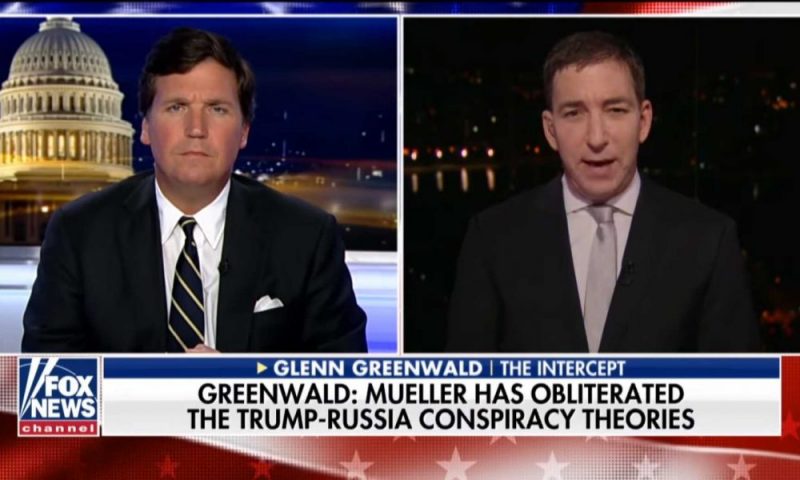
The two-pronged conspiracy theory that has dominated U.S. political discourse for almost three years – that (1) Trump, his family and his campaign conspired or coordinated with Russia to interfere in the 2016 election, and (2) Trump is beholden to Russian President Vladimir Putin — was not merely rejected today by the final report of Special Counsel Robert Mueller. It was obliterated: in an undeniable and definitive manner.
The key fact is this: Mueller – contrary to weeks of false media claims – did not merely issue a narrow, cramped, legalistic finding that there was insufficient evidence to indict Trump associates for conspiring with Russia and then proving their guilt beyond a reasonable doubt.
That would have been devastating enough to those who spent the last two years or more misleading people to believe that conspiracy convictions of Trump’s closest aides and family members were inevitable. But his mandate was much broader than that: to state what did or did not happen.
That’s precisely what he did: Mueller, in addition to concluding that evidence was insufficient to charge any American with crimes relating to Russian election interference, also stated emphatically in numerous instances that there was no evidence – not merely that there was insufficient evidence to obtain a criminal conviction – that key prongs of this three-year-old conspiracy theory actually happened.
As Mueller himself put it: “in some instances, the report points out the absence of evidence or conflicts in the evidence about a particular fact or event.”
With regard to Facebook ads and Twitter posts from the Russia-based Internet Research Agency, for example, Mueller could not have been more blunt: “The investigation did not identify evidence that any U.S. persons knowingly or intentionally coordinated with the IRA’s interference operation” (emphasis added). Note that this exoneration includes not only Trump campaign officials but all Americans:

To get a further sense for how definitive the Report’s rejection is of the key elements of the alleged conspiracy theory, consider Mueller’s discussion of efforts by George Papadopoulos, Joseph Misfud and and “two Russian nationals” whereby they tried “to arrange a meeting between the Campaign and Russian officials” to talk about how the two sides could work together to disseminate information about Hillary Clinton.
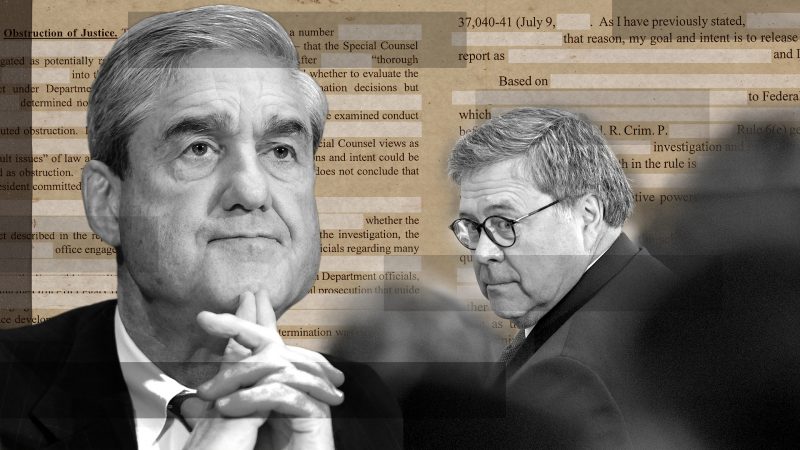
As Mueller puts it: “No meeting took place.”
Several of the media’s most breathless and hyped “bombshells” were dismissed completely by Mueller. Regarding various Trump officials’ 2016 meetings with Russian Ambassador Sergey Kislyak, Mueller said they were “brief, public and nonsubstantive.”
Concerning the much-hyped change to GOP platform regarding Ukraine, Mueller wrote that the “evidence does not establish that one campaign official’s efforts to dilute a portion of the Republican platform was undertaken at the behest of candidate Trump or Russia,” and further noted that such a change was consistent with Trump’s publicly stated foreign policy view (one shared by Obama) to avoid provoking gratuitous conflict with the Kremlin over arming Ukrainians.
Mueller also characterized a widely hyped “meeting” between then-Senator Jeff Sessions and Kislyak as one that did not “include any more than a passing mention of the presidential campaign.”
Regarding one of the most-cited pieces of evidence by Trump/Russia conspiracists – that Russia tried once Trump was nominated to shape his foreign policy posture toward Russia – Mueller concluded that there is simply no evidence to support it:

In other crucial areas, Mueller did not go so far as to say that his investigation “did not identify evidence” but nonetheless concluded that his 22-month investigation “did not establish” that the key claims of the conspiracy theory were true.
Regarding alleged involvement by Trump officials or family members in the Russian hacks, for instance, Mueller explained: “the investigation did not establish that members of the Trump campaign conspired or coordinated with the Russian government in its election interference activities.”

And Mueller’s examination of all the so-called “links” between Trump campaign officials and Russia that the U.S. media has spent almost three years depicting as “bombshell” evidence of criminality met the same fate: the evidence could not, and did not, establish that any such links constituted “coordination” or “conspiracy” between Trump and Russia:

Perhaps most amazingly, even low-level, ancillary, hangers-on to the Trump campaign that even many Russiagate skeptics thought might end up being charged as Russian agents were not.
All the way back in March, 2017, in reporting that even anti-Trump intelligence officials were warning Democrats that there was no solid evidence of a Trump/Russia conspiracy, I predicted that the appointment of a Special Counsel (which I vehemently favored) would likely end up finding evidence of financial impropriety by Paul Manafort unrelated to the 2016 election, as well as a possible indictment of someone like Carter Page for acting in concert with the Russian government:
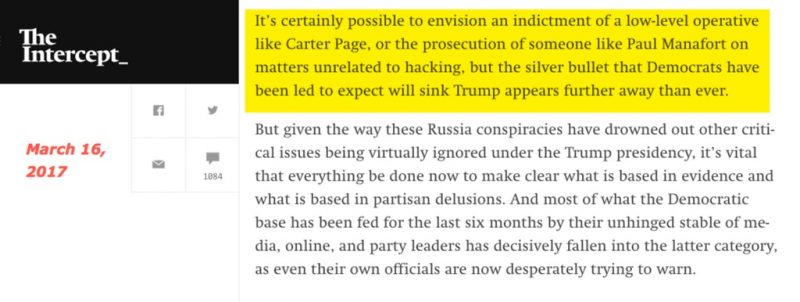
But so vacant is the Mueller investigation when it comes to supporting any of the prevailing conspiracy theories that it did not find even a single American whom it could indict or charge with illegally working for Russia, secretly acting as a Russian agent, or conspiring with the Russians over the election – not even Carter Page. That means that even long-time Russiagate skeptics such as myself over-estimated the level of criminality and conspiracy evidence that Robert Mueller would find:
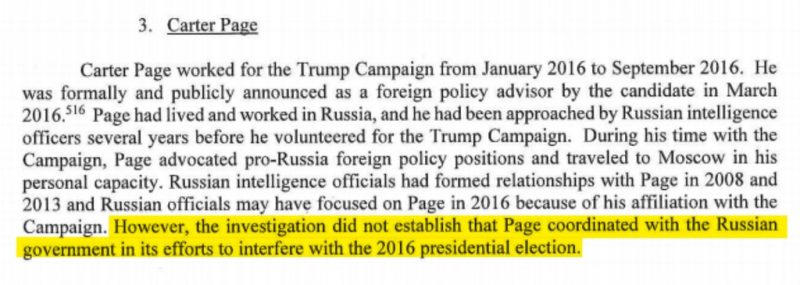
In sum, Democrats and their supporters had the exact prosecutor they all agreed was the embodiment of competence and integrity in Robert Mueller. He assembled a team of prosecutors and investigators that countless media accounts heralded as the most aggressive and adept in the nation. They had subpoena power, the vast surveillance apparatus of the U.S. government at their disposal, a demonstrated willingness to imprison anyone who lied to them, and unlimited time and resources to dig up everything they could.
The result of all of that was that not a single American – whether with the Trump campaign or otherwise – was charged or indicted on the core question of whether there was any conspiracy or coordination with Russia over the election. No Americans were charged or even accused of being controlled by or working at the behest of the Russian government. None of the key White House aides at the center of the controversy who testified for hours and hours – including Donald Trump, Jr. or Jared Kushner – were charged with any crimes of any kind, not even perjury, obstruction of justice or lying to Congress.
These facts are fatal to the conspiracy theorists who have drowned U.S. discourse for almost three years with a dangerous and distracting fixation on a fictitious espionage thriller involved unhinged claims of sexual and financial blackmail, nefarious infiltration of the U.S. Government by familiar foreign villains, and election cheating that empowered an illegitimate President. They got the exact prosecutor and investigation that they wanted, yet he could not establish that any of this happened and, in many cases, established that it did not.
The anti-climactic ending of the Mueller investigation is particularly stunning given how broad Mueller’s investigative scope ended up being, extending far beyond the 2016 election into years worth of Trump’s alleged financial dealings with Russia (and, obviously, Manafort’s with Ukraine and Russia). There can simply be no credible claim that Mueller was, in any meaningful way, impeded by scope, resources or topic limitation from finding anything for which he searched.
Despite efforts today by long-time conspiracist theorists to drastically move goalposts so as to claim vindication, the historical record could not be clearer that Mueller’s central mandate was to determine whether crimes were committed by Trump officials in connection with alleged Russian interference in the election. The first paragraph of the New York Times article from May, 2017, announcing Mueller’s appointment, leaves no doubt about that:
The Justice Department appointed Robert S. Mueller III, a former F.B.I. director, as special counsel on Wednesday to oversee the investigation into ties between President Trump’s campaign and Russian officials, dramatically raising the legal and political stakes in an affair that has threatened to engulf Mr. Trump’s four-month-old presidency.
As recently as one month ago, former CIA Director and current NBC News analyst John Brennan was confidently predicting that Mueller could not possibly close his investigation without first indicting a slew of Americans for criminally conspiring with Russia over the election, and specifically predicted that Trump’s family members would be included among those so charged:
John Brennan has a lot to answer for—going before the American public for months, cloaked with CIA authority and openly suggesting he’s got secret info, and repeatedly turning in performances like this. pic.twitter.com/EziCxy9FVQ
— Terry Moran (@TerryMoran) March 25, 2019
Obviously, none of that happened. Nor were any of the original accusations that launched this three-year-long mania — from an accusatory August, 2016 online commercial from the Clinton campaign — corroborated by the Mueller Report:
Indeed, so many of the most touted media “bombshells” claiming to establish Trump/Russia crimes have been proven false by this report. Despite an extensive discussion of Paul Manafort’s activities, nothing in the Report even hints, let alone states, that he ever visited Julian Assange in the Ecuadorian Embassy, let alone visited him three times, including during the 2016 election.
How the Guardian could justify still not retracting that false story is mystifying.
Faring even worse is the Buzzfeed bombshell from January claiming that “President Donald Trump directed his longtime attorney Michael Cohen to lie to Congress about negotiations to build a Trump Tower in Moscow” and that “Cohen also told the special counsel that after the election, the president personally instructed him to lie — by claiming that negotiations ended months earlier than they actually did — in order to obscure Trump’s involvement.”
Mueller himself responded to the story by insisting it was false, and his Report directly contradicts it, as it makes clear that Cohen told Mueller the exact opposite:

Equally debunked is CNN’s major blockbuster by Jim Sciutto, Carl Bernstein, and Marshall Cohen from last July that “Michael Cohen, President Donald Trump’s former personal attorney, claims that then-candidate Trump knew in advance about the June 2016 meeting in Trump Tower.”
The Mueller Report says the exact opposite: that Cohen had no knowledge of Trump’s advanced knowledge.
And the less said about the Steele Dossier, pee-pee tapes, secret meetings in Prague, and indescribably unhinged claims like this one, the better:
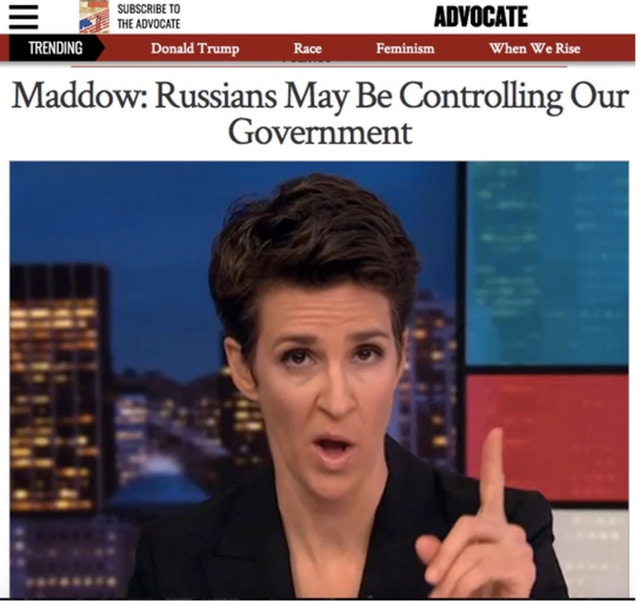
But beyond the gutting of these core conspiracy claims is that Mueller’s investigation probed areas far beyond the initial scope of Trump/Russia election-conspiring, and came up empty. Among other things, Mueller specifically examined Trump’s financial dealings with Russia to determine whether that constituted incriminating evidence of corrupt links:
Because Trump’s status as a public figure at the time was attributable in large part to his prior business and entertainment dealings, this Office investigated whether a business contact with Russia-linked individuals and entities during the campaign period—the Trump Tower Moscow project, see Volume I, Section IV.A.1, infra—led to or involved coordination.
Indeed, Mueller’s examination of Trump’s financial dealings with Russia long pre-dates the start of the Trump campaign, going back several years before the election:

Mueller additionally made clear that he received authorization to investigate numerous Americans for ties to Russia despite their not being formally associated with the Trump campaign, including Michael Cohen and Roger Stone.
And regarding Cohen, Mueller specifically was authorized to investigate any attempts by Cohen to “receive funds from Russia-backed entities.”
None of this deep diving to other individuals or years of alleged financial dealings with Russian resulted in any finding that Trump or any of his associates were controlled by, or corruptly involved with, the Russian government.
Then there is the issue of Manafort’s relationship with the Ukrainians, and specifically his providing of polling data to Konstantin Kilimnik, an episode which Trump/Putin conspiracist Marcy Wheeler, along with many others, particularly hyped over and over.
To begin with, Mueller said his office “did not identify evidence of a connection” between that act and “Russian interference in the election,” nor did he “establish that Manafort otherwise coordinated with the Russian government on its election-inteference efforts”:

Also endlessly hyped by Wheeler and other conspiracists were the post-election contacts between Trump and Russia: as though it’s unusual that a major power would seek to build new, constructive relationships with a newly elected administration.
Indeed, Wheeler went so far as to cite these post-election contacts to turn her own source into the FBI on the ground that it constituted smoking gun evidence, an act for which she was praised by the Washington Post (nothing Wheeler claimed about the evidence “related to the Mueller investigation” that she claimed to possess appears to be in the Mueller Report). Here again, the Mueller Report could not substantiate any of these claims:

The centerpiece of the Trump/Russia conspiracy – the Trump Tower meeting – was such a dud that Jared Kushner, halfway through the meeting, texted Manafort to declare the meeting “a waste of time,” and then instructed his assistant to call him so that he could concoct a reason to leave.
Not only could Mueller not find any criminality in this meeting relating to election conspiring, but he could not even use election law to claim it was an illegal gift of something of value from a foreigner, because, among other things, the information offered was of so little value that it could not even pass the $2,000 threshold required to charge someone for a misdemeanor, let alone the $25,000 required to make it a felony.
Neither the Trump Tower meeting itself nor its participants – for so long held up as proof of the Trump/Russia conspiracy – could serve as the basis for any finding of criminality. Indeed, the key Trumpworld participants who testified about what happened at that meeting and its aftermath (Trump Jr. and Kushner) were not even accused by Mueller of lying about any of it.
None of this is to say that the Mueller Report exonerates Trump of wrongdoing. Mueller makes clear, for instance, that the Trump campaign not only knew that Russia was interested in helping it win the election but was happy to have that help.
There’s clearly nothing criminal about that. One can debate whether it’s unethical for a presidential campaign to have dirt about its opponent released by a foreign government, though anyone who wants to argue that has to reconcile that with the fact that the DNC had a contractor working with the Ukrainian government to help Hillary Clinton win by feeding them dirt on Trump and Manafort, as well as a paid operative named Christopher Steele (remember him?) working with Russian officials to get dirt on Trump.
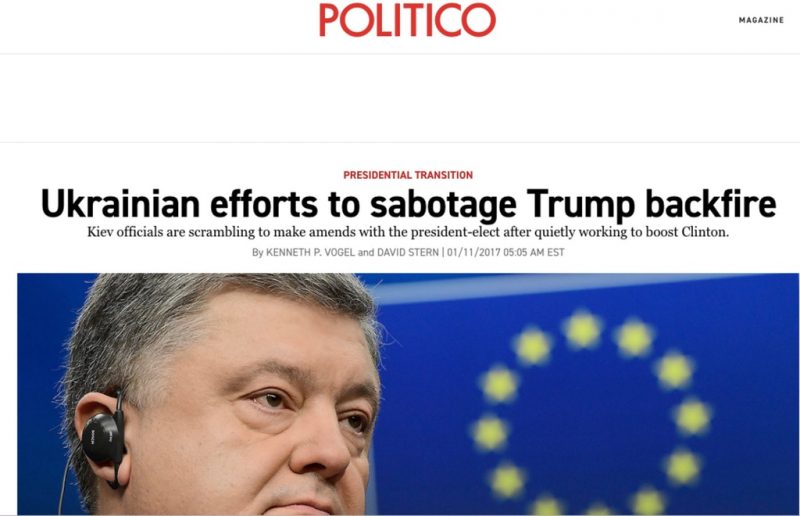
As is true of all investigations, Mueller’s team could not access all relevant information. Some was rendered inaccessible through encryption. Other information was deleted, perhaps with corrupt motives. And some witnesses lied or otherwise tried to obstruct the investigation.
As a result, it’s of course possible that incriminating evidence existed that Mueller – armed with subpoena power, unlimited resources, 22 months of investigative work, and a huge team of top-flight prosecutors, FBI agents, intelligence analysts and forensic accountants – did not find.
But anything is possible. It’s inherently possible that anyone is guilty of any crime but that the evidence just cannot be found to prove it. One cannot prove a negative.
But the only way to rationally assess what happened is by looking at the evidence that is available, and that’s what Mueller did.
And there’s simply no persuasive way – after heralding Mueller and his team as the top-notch investigators that they are and building up expectations about what this would produce – for any honest person to deny that the end of the Mueller investigation was a huge failure from the perspective of those who pushed these conspiracies.
Mueller certainly provides substantial evidence that Russians attempted to meddle in various ways in the U.S. election, including by hacking the DNC and Podesta and through Facebook posts and tweets. There is, however, no real evidence that Putin himself ordered this, as was claimed since mid-2016.
But that Russia had done such things has been unsurprising from the start, given how common it is for the U.S. and Russia to meddle in everyone’s affairs, including one another’s, but the scope and size of it continues to be minute in the context of overall election spending:
To reach larger U.S. audiences, the IRA purchased advertisements from Facebook that promoted the IRA groups on the news feeds of U.S. audience members. According to Facebook, the IRA purchased over 3,500 advertisements, and the expenditures totaled approximately $100,000.
The section of Mueller’s report on whether Trump criminally attempted to obstruct the investigation is full of evidence and episodes that show Trump being dishonest, misleading, and willing to invoke potentially corrupt tactics to put an end to it.
But ultimately, the most extreme of those tactics were not invoked (at times because Trump’s aides refused), and the actions in which Trump engaged were simply not enough for Mueller to conclude that he was guilty of criminal obstruction.
As Mueller himself concluded, a reasonable debate can be conducted on whether Trump tried to obstruct his investigation with corrupt intent. But even on the case of obstruction, the central point looms large over all of it: there was no underlying crime established for Trump to cover-up.
All criminal investigations require a determination of a person’s intent, what they are thinking and what their goal is.
When the question is whether a President sought to kill an Executive Branch investigation – as Trump clearly wanted to do here – the determinative issue is whether he did so because he genuinely believed the investigation to be an unfair persecution and scam, or whether he did it to corruptly conceal evidence of criminality.
That Mueller could not and did not establish any underlying crimes strongly suggests that Trump acted with the former rather than the latter motive, making it virtually impossible to find that he criminally obstructed the investigation.
The nature of our political discourse is that nobody ever needs to admit error because it is easy to confine oneself to strictly partisan precincts where people are far more interested in hearing what advances their agenda or affirms their beliefs than they are hearing the truth.
For that reason, I doubt that anyone who spent the last three years pushing utterly concocted conspiracy theories will own up to it, let alone confront any accountability or consequences for it.
But certain facts will never go away no matter how much denial they embrace. The sweeping Mueller investigation ended with zero indictments of zero Americans for conspiring with Russia over the 2016 election.
Both Donald Trump, Jr. and Jared Kushner – the key participants in the Trump Tower meeting – testified for hours and hours yet were never charged for perjury, lying or obstruction, even though Mueller proved how easily he would indict anyone who lied as part of the investigation.
And this massive investigation simply did not establish any of the conspiracy theories that huge parts of the Democratic Party, the intelligence community and the U.S. media spent years encouraging the public to believe.
Those responsible for this can refuse to acknowledge wrongdoing. They can even claim vindication if they want and will likely be cheered for doing so.
But the contempt in which the media and political class is held by so much of the U.S. population – undoubtedly a leading factor that led to Trump’s election in the first place – will only continue to grow as a result, and deservedly so.
People know they were scammed, that their politics was drowned for years by a hoax. And none of that will go away no matter how insulated media and political elites in Washington, northern Virginia, Brooklyn, and large West Coast cities keep themselves, and thus hear only in-group affirmation while blocking out all of that well-earned scorn.
Correction: A paragraph was originally included that misread a tweet from earlier today by the New York Times’ Kenneth Vogel, in which he asserted that the Mueller Report confirmed, not negated, the New York Times’ original, now-retracted report about Paul Manafort. In that tweet, Vogel was suggesting that the NYT’s retraction was wrong (as Marcy Wheeler argued), not that the original story was wrong. That paragraph, which also critiqued Wheeler’s analysis of the New York Times’ retraction, was in error and was deleted almost immediately after publication of this article.
Glenn Greenwald is one of three co-founding editors of The Intercept. He is a journalist, constitutional lawyer, and author of four New York Times best-selling books on politics and law. https://theintercept.com/staff/glenn-greenwald/
By Glenn Greenwald
This article was originally published by “The Intercept ”
The 21st Century
